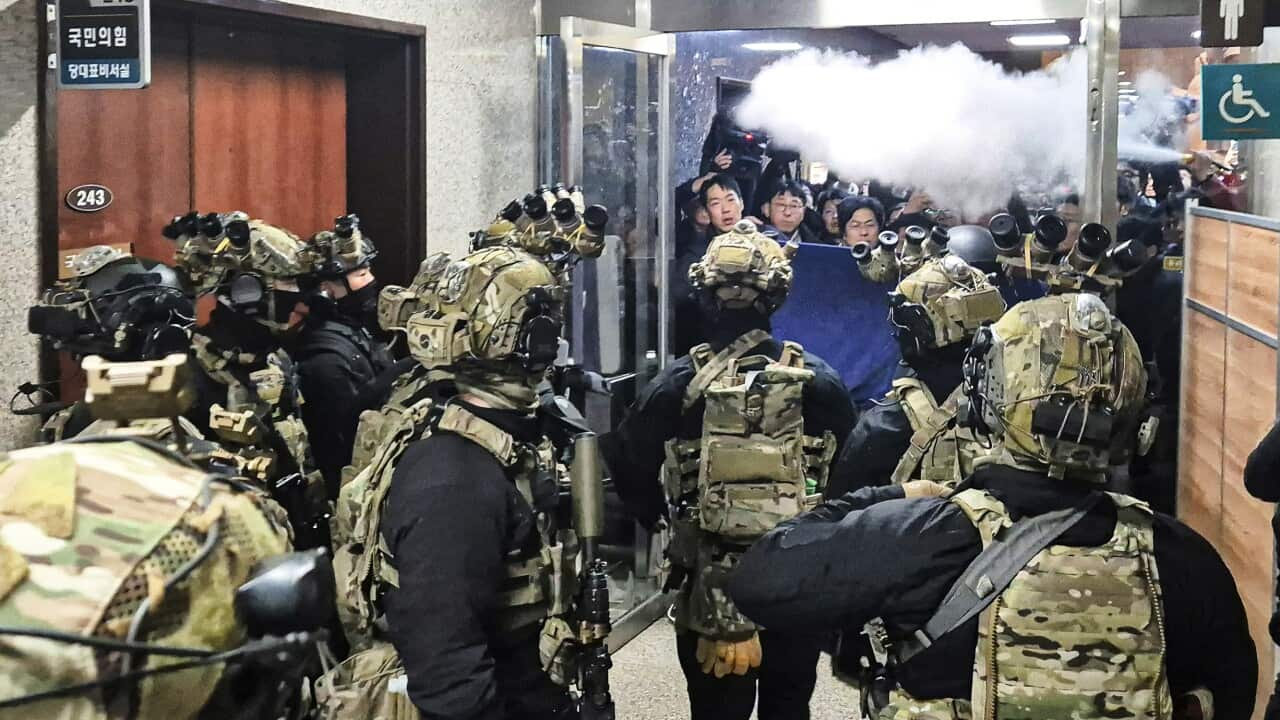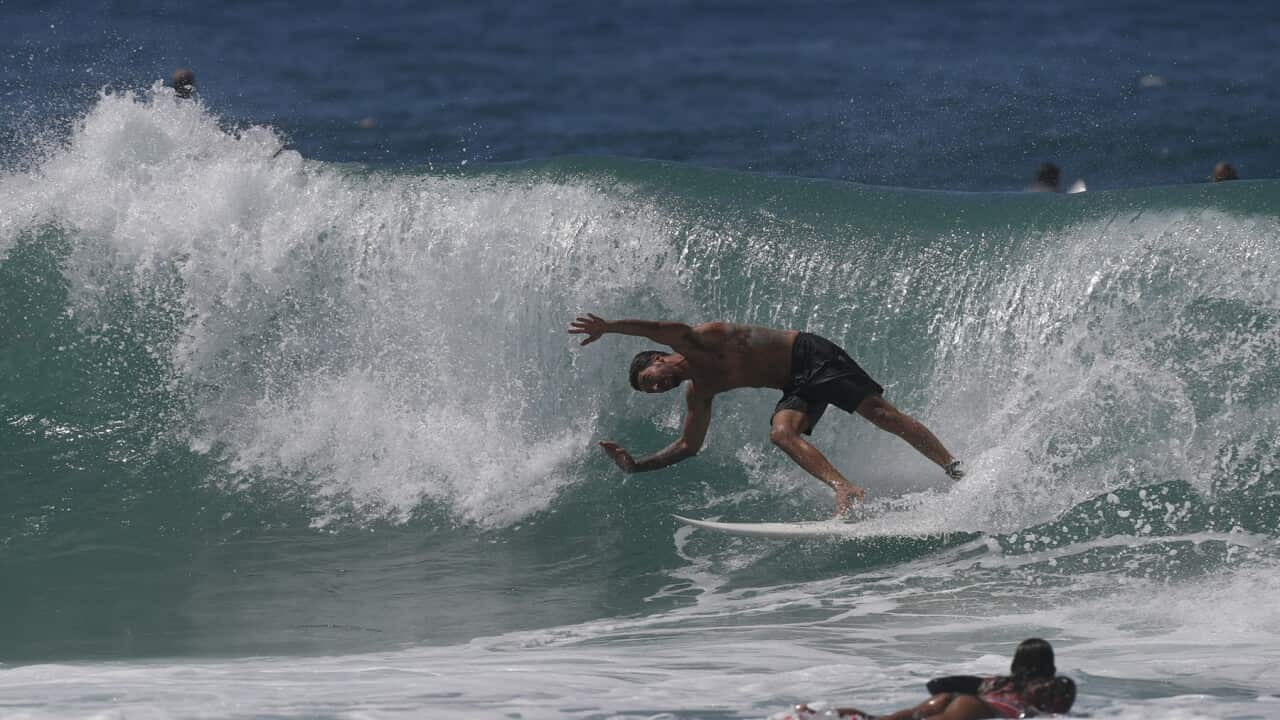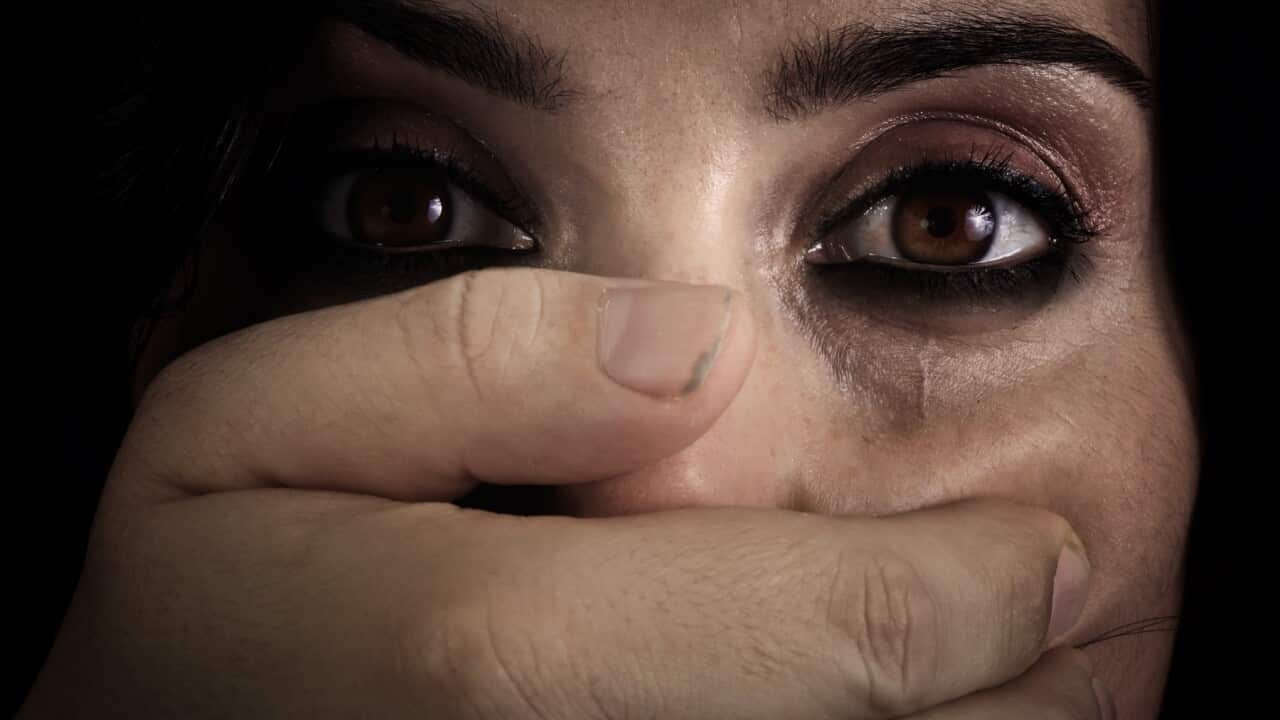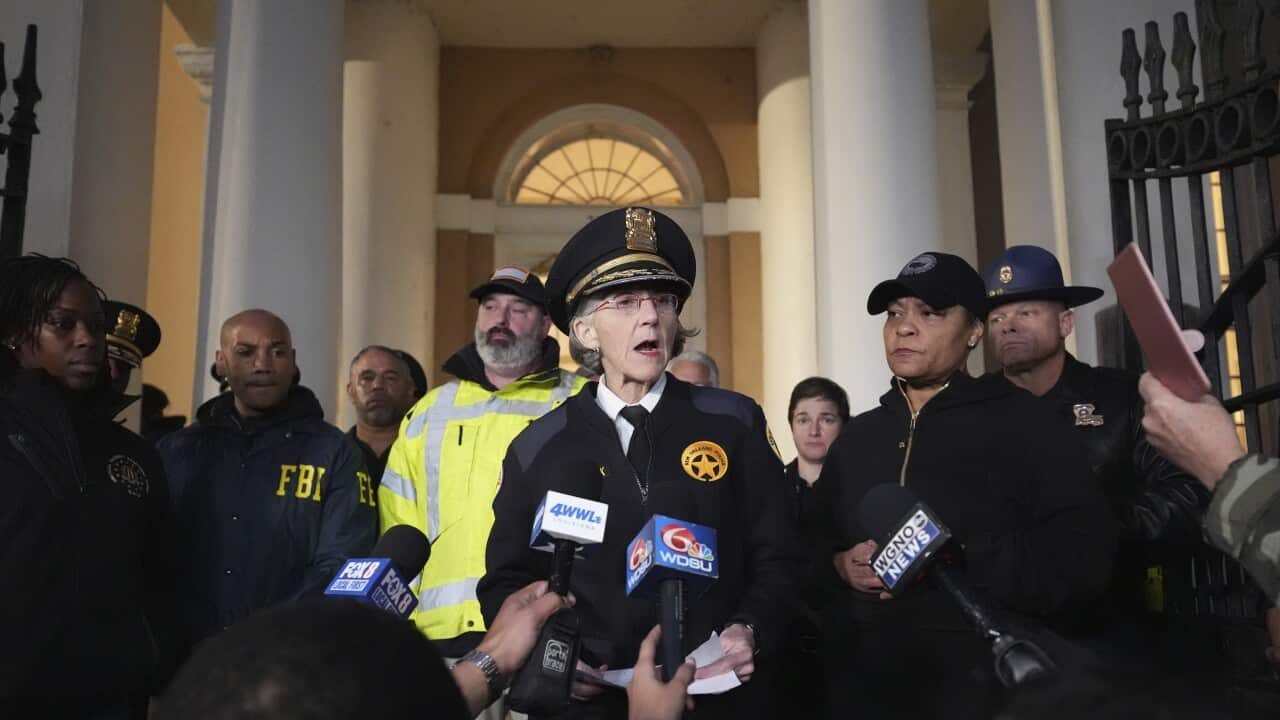English
** SOUTH KOREA - CHAOS IN SEOUL; PRESIDENT FIRST DECLARES MARTIAL LAW TO PROTECT THE COUNTRY FROM PYONGYANG'S THREAT AND THEN LIFTS IT
** MIDDLE EAST - AFTER TAKING ALEPPO, APPEAL FROM SYRIAN COMMUNITY OF AUSTRALIA: 'SITUATION IS TRAGIC'
***
Good morning, Andrea Pagani. This is the SBS Italian news for today. We open from South Korea, where South Korean President Yoon Suk Yeol has lifted “emergency martial law.”
A measure the president himself had announced last night in a televised address to the nation, calling it “necessary” to protect the liberal country from “communist forces from North Korea and to eliminate anti-state elements.” Parliament-the National Assembly- immediately voted against the proposal with a large majority, 190 votes in favor out of 300, a circumstance that had sparked tension throughout the country.
According to the law, the president had to comply with the parliament's decision, but the military declared it would enforce martial law until the president lifted it himself. As a result, the South Korean parliament had been blocked, and all political activities were banned while army helicopters landed on the roof of the building. The opposition, represented by the Democratic Party, had called on its deputies to assemble in front of the parliament building, and clashes between protesters and police had occurred during the day yesterday.
After a tense night, South Korean President Yoon Suk Yeol announced that martial law had been lifted.
"After the National Assembly's demand to lift martial law, martial law troops have been withdrawn. I will accept the National Assembly's demand and lift martial law through a cabinet meeting."
***
We go to the Middle East, where clashes continue between the regular Syrian army-supported by Iranian militias and jihadist rebels, who have captured Aleppo and several towns in Idlib and Hama provinces. Australians with relatives in Aleppo have expressed grave concern over the sudden escalation of violence in Syria. Abdul Ghani Rahmo of Adelaide has lost contact with his family members in Aleppo and described the situation as “tragic”.
(In-language then translated into English): "In fact, the situation is very difficult. We try our best to watch the news on TV and we keep track of the latest developments to stay informed of what is happening and to talk to our relatives there. The situation is tragic, really tragic. There is no food and no sleep there. They can't sleep there and we cannot sleep here."
Reem George Sharbat of Melbourne, originally from Aleppo, is distressed about her sister and niece left in the city. Remembering the city's beauty before the war, Reem reveals that she has not slept for days, hearing close gunfire during calls with her family members.
(In-language then translated into English): "It is the third day that I have not slept even for ten minutes. I am still in contact with my family in Aleppo, but all food supplies have been cut off, particularly since the shops closed. I was talking to them yesterday, and I could hear a lot of gunfire. It felt like the gunfire was close to me - and I started shaking. There is a feeling that I am near them. When we were in Syria, we lived similar days. There was no sleep for us. Aleppo is my soul, I love it very much. It represents life and the wonderful years we lived. In the days before the war, Aleppo was beautiful, but after it, everything changed."
***
We return to Australia to discuss the National Awards for Disability Leadership, which are given to Australians living with disabilities who have distinguished themselves in seven categories, including social impact, innovation, and change.
The winners were announced yesterday on International Day of Persons with Disabilities. This year's theme was “Exalting the Leadership of People with Disabilities for an Inclusive and Sustainable Future.” Among the honorees, Emma Bennison received the Lifetime Achievement Award for her work in reforming and modernising organisations such as Blind Citizens Australia and Vision Australia. At the same time, Aaron Cotton won the Innovation Award for developing a platform that allows NDIS participants to choose their roommates and providers.
In a video celebrating the day, lawyer Cameron Bloomfield highlighted the importance of these awards.
"Just to be recognised that we have a disability and the accomplishments that some people with disabilities give to the community is like a role model for other people with disabilities."
Italian
** COREA DEL SUD - CAOS A SEUL, IL PRESIDENTE PRIMA DICHIARA LA LEGGE MARZIALE PER PROTEGGERE IL PAESE DALLA MINACCIA DI PYONGYANG, POI LA REVOCA
** MEDIO ORIENTE - DOPO LA PRESA DI ALEPPO, APPELLO DELLA COMUNITÀ SIRIANA D'AUSTRALIA: "LA SITUAZIONE È TRAGICA"
***
Buongiorno da Andrea Pagani con le notizie di SBS Italian di oggi che apriamo dalla Corea del Sud, dove Il presidente sudcoreano Yoon Suk Yeol ha revocato la "legge marziale d'emergenza".
Una misura che lo stesso presidente aveva annunciato ieri sera in un discorso televisivo alla nazione definendola "necessaria" per proteggere il Paese liberale dalle "forze comuniste della Corea del Nord e per eliminare gli elementi anti Stato". Il parlamento - l'Assemblea nazionale - ha immediatamente votato contro la proposta con un'ampia maggioranza, 190 voti a favore su 300, circostanza che aveva scatenato tensione in tutto il Paese.
Secondo la legge, infatti, il presidente doveva conformarsi alla decisione del parlamento, ma l'esercito aveva dichiarato che avrebbe fatto rispettare la legge marziale finché non fosse stata revocata dallo stesso presidente. Il parlamento sudcoreano era pertanto stato bloccato e tutte le attività politiche erano state vietate mentre gli elicotteri dell'esercito erano atterrati sul tetto dell'edificio. L'opposizione, rappresentata dal Partito democratico, aveva invitato i suoi deputati a riunirsi davanti alla sede del parlamento, e nella giornata di ieri si erano verificati scontri tra manifestanti e polizia.
Dopo una notte di grande tensione, il presidente sudcoreano Yoon Suk Yeol ha annunciato che la legge marziale è stata revocata.
"After the National Assembly's demand to lift martial law, martial law troops have been withdrawn. I will accept the National Assembly's demand and lift martial law through a cabinet meeting."
***
Andiamo in Medio Oriente, dove proseguono gli scontri tra l'esercito regolare siriano - appoggiato da milizie iraniane - e i ribelli jihadisti, che hanno conquistato Aleppo e numerose città nelle province di Idlib e Hama. Gli australiani con parenti ad Aleppo hanno espresso forte preoccupazione per l'improvvisa escalation di violenza in Siria. Abdul Ghani Rahmo di Adelaide ha perso i contatti con i suoi familiari ad Aleppo e al microfono di SBS ha descritto la situazione come "tragica".
(In-language then translated into English): "In fact, the situation is very difficult. We try our best to watch the news on TV and we keep track of the latest developments to stay informed of what is happening and to talk to our relatives there. The situation is tragic, really tragic. There is no food and no sleep there. They can't sleep there and we cannot sleep here."
Reem George Sharbat di Melbourne, originaria di Aleppo, è angosciata per sua sorella e sua nipote rimaste in città. Ricordando la bellezza della città prima della guerra, Reem rivela di non dormire da giorni, sentendo colpi di arma da fuoco ravvicinati durante le chiamate con i suoi familiari.
(In-language then translated into English): "It is the third day that I have not slept even for ten minutes. I am still in contact with my family in Aleppo, but all food supplies have been cut off, particularly since the shops closed. I was talking to them yesterday, and I could hear a lot of gunfire. It felt like the gunfire was close to me - and I started shaking. There is a feeling that I am near them. When we were in Syria, we lived similar days. There was no sleep for us. Aleppo is my soul, I love it very much. It represents life and the wonderful years we lived. In the days before the war, Aleppo was beautiful, but after it everything changed in it."
***
Torniamo in Australia per parlare dei National Awards for Disability Leadership, i premi conferiti ad australiani che convivono con disabilità e che si sono distinti in sette categorie, tra cui impatto sociale, innovazione e cambiamento.
I vincitori sono stati annunciati ieri, in occasione della Giornata internazionale delle persone con disabilità. Il tema di quest'anno era: “Esaltare la leadership delle persone con disabilità per un futuro inclusivo e sostenibile”. Tra i premiati, Emma Bennison ha ricevuto il premio alla carriera per il suo lavoro di riforma e modernizzazione di organizzazioni come Blind Citizens Australia e Vision Australia, mentre Aaron Cotton si è aggiudicato il premio per l'innovazione grazie allo sviluppo di una piattaforma che consente ai partecipanti all'NDIS di scegliere i propri coinquilini e fornitori.
In un video che celebra la giornata, l'avvocato Cameron Bloomfield ha sottolineato l'importanza di questi premi.
"Just to be recognised that we have a disability and the accomplishments that some people with disabilities give to the community is like a role model for other people with disabilities."











